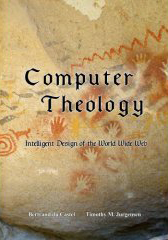PRESS
COMPUTER THEOLOGY |
||||
2 Mechanics of Evolution
That
Which Doesn’t Kill Us Makes Us Stronger
Computer systems
mirror the structures and mechanisms of people. Not too surprising an
assessment, but it does provide justification for suggesting that just as with
people who are physiologically inclined to form and maintain complex social
organizations, the evolutionary progression of computers has embraced the
concepts of trust and policy within widespread collections of devices. Indeed,
these collections form social organizations in their own right. Within human
social structures, policy environments, including the means of policy
implementation, arose as a collection of mechanisms through which humans were
better able to coordinate their activities and to establish shared patterns of
behavior for their collective benefit. Thus, we observe that social policy is a
natural result of the human evolutionary process. Consequently, we might
anticipate that the evolution of computer systems, and more to the point, the
mechanisms that are enabled by those systems, will mimic the behaviors found in
the human species. We would then further suggest that the personal electronic
device, currently the most intimately personal variant of computer, represents
an emergent species within the larger domain of computer systems; a species
that offers the prospect of bubbling to the top of the evolutionary froth, just
as did its organic forbearers. Few would question modern
mankind as the current pinnacle of the biological evolutionary process.
However, a suggestion that a new, currently minimalist variant of computer
might be associated with some future apex of computer evolution is perhaps less
obvious. Certainly, we would expect more general agreement that current
incarnations of basic personal electronic devices are still far from reaching
their full potential. Consequently, suggesting that they portend the emergence
of a paradigm that could significantly impact the state of computer technology
as an extension of personal social interaction and personality characteristics
requires a bit more justification. An interesting question is, of course, is it
plausible that achieving their full potential will entail significant extension
through the evolutionary process? Further, can we anticipate the direction of
this evolution based on comparisons to the processes that resulted in current
social orders? These are among the questions we seek to explore, if not answer. As a guide to consideration of these rather tenuous concerns, it is instructive to look at the foundations, first of organic life and then of computer systems, in order to better consider their similarities, as well, perhaps, as some of their differences. While of course we recognize the |
||||
|
||||
© Midori Press, LLC, 2008. All rights reserved for all countries. (Inquiries) The contents of ComputerTheology: Intelligent Design of the World Wide Web are presented for the sole purpose of on-line reading to allow the reader to determine whether to purchase the book. Reproduction and other derivative works are expressly forbidden without the written consent of Midori Press. Legal deposit with the US Library of Congress 1-33735636, 2007.
|
ComputerTheology Intelligent Design of the World Wide Web Bertrand du Castel and Timothy M. Jurgensen Midori Press, Austin Texas 1st Edition 2008 (468 pp) ISBN 0-9801821-1-5 |
Book available at Midori Press (regular) |
